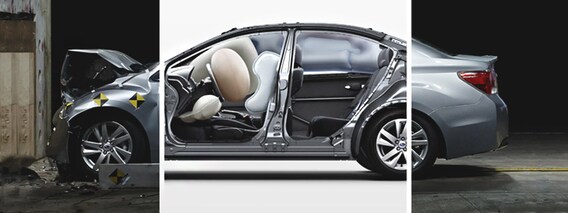We all know what safety features are when it comes to our car, but we may not know they are commonly called ADAS, which stands for Advanced driver-assistance systems. These ADAS features are the latest and greatest gizmos that come with your car that aid in avoiding a collision. This includes blind-spot monitors, lane-keep assists, pre-collision braking, and a whole lot more depending on the year and makes of vehicle.
It’s hard to believe that few years ago, the only safety system that needed any type of recalibration after an accident were the airbags. Now even those are located in the front and side of both drivers and passengers and despite not deploying may require inspection and repair. It used to be easy to know what was wrong with our car because a light would light up on the dash telling body shops that they needed to have it reset or recalibrated, or that there was a problem like a loose wire somewhere in the system.
Today, these complex systems mean there are no dummy lights for faulty ADAS systems to help us easily identify what is wrong with your car. We have to scan for them, and if we don’t, we have no way of knowing if your vehicle is throwing off fault and error codes.

You would think that your body shop is automatically doing all this for you, but consider this, vehicle diagnostics provider CarMD reported that its third-party PRO SCAN tool had found issues on 80 percent of 5,642 vehicles checked by repairers.
CarMD wrote that “a majority” of those 80 percent had “hidden problems not likely identified by a visual vehicle inspection alone.”
“On average, these vehicles had six issues that needed to be checked, repaired, or replaced, resulting in improved peace of mind for vehicle owners and increased average repair order (ARO) for shops,” the company continued in a news release.
The alarming point that CarMD is saying is: of all of the body shops that use their scanning tools, a whomping 80 percent of the vehicles that were scanned also had other system issues that would otherwise be undetectable since they don’t show any indicator lights. That’s a pretty alarming statistic if you think about it.

Of all the cars scanned, only 32 percent of them displayed the more commonly known check engine light, which is not collision or ADAS related.
But on the 68 percent without a check engine light, “nearly three quarters (74%) of these vehicles … reported a problem with one or more system. On average, each vehicle had six different modules that required attention, resulting in additional work for the shop.”
“The most common Network System codes were related to the Body Control Module (BCM), Transmission Control Module (TCM), Instrument Panel Cluster (IPC), Powertrain Control Module (PCM), Engine Control Module (ECM) and radio.”
Here is the part that impacts customer safety, though: “Some less commonly diagnosed issues, but equally important due to their potential impact on passenger safety, were a faulty backup camera, adaptive cruise control, adaptive headlights, lane departure alert and seat belt retractor motor module.”
CarMD spokeswoman Kristin Brocoff confirmed these 74 percent didn’t throw any of the other dash lights either.

“In most of those cases it was an issue that doesn’t report a dashboard warning light at all,” she wrote in an email. “Other scenarios included situations where a CEL bulb was removed or disconnected from the combination meter. In others, it was an intermittent issue that hadn’t triggered a warning light.”
With that said, it is crucial that you choose a body shop that is going to perform all the necessary steps of your car’s collision repair process, including a pre and post-repair scan and calibration, but you may be wondering why might a shop would elect not to scan the vehicle?
Believe it or not, there are a lot of auto body repair shops that exist who continue to operate the same way they did in the good old days and simply rely on their experience. Rather than look up new procedures and recommendations they will simply rely on how things have always been done. Then on the other hand, you also have body shops who are under pressure to keep repair costs low. Here at, 3D Collision Center, we don’t just rely on how things have always been done and ensure we are up to date on the latest and most accurate collision repair procedures. We scan every vehicle that comes into our shop, and that should give you peace of mind.
We have 7 different locations across Delaware, Chester, and Montgomery Counties. Feel free to give us a call at anytime at (877)-692-7776. For a list of the phone numbers for each of our locations or to schedule an estimate, click here.



